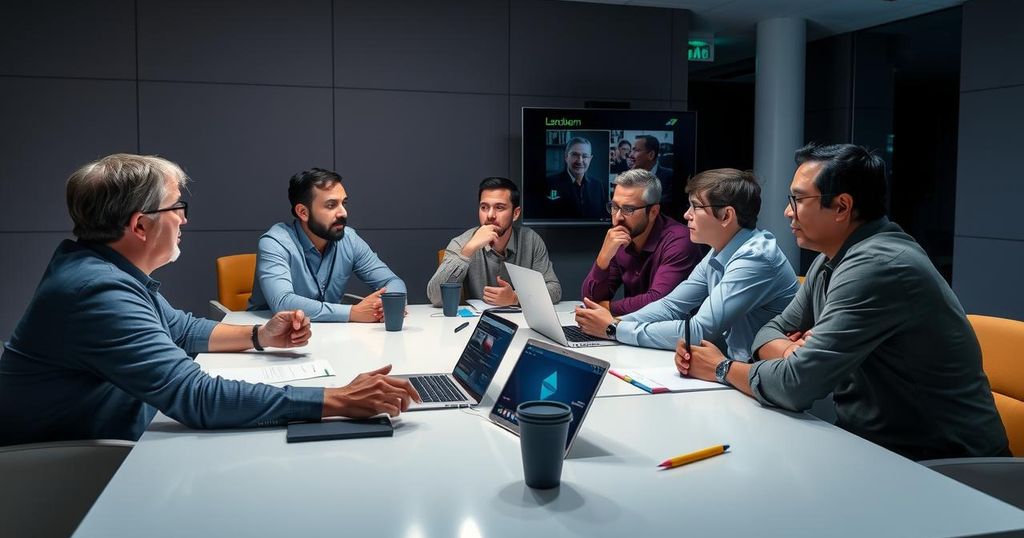Ethereum Developers Tackle Core Issues in Latest Consensus Call
On November 28, 2024, the 146th ACDC call convened, addressing critical issues including a validator deposit bug on the Mekong testnet and updates to the Pectra Devnet 5. Key proposals like EIP 7691 focused on increasing blob throughput capacity while EIP 7623 aimed at reducing block sizes faced mixed reactions. The discussions concluded with a commitment to enhance Ethereum’s censorship resistance and coordination processes in future meetings.
On November 28, 2024, Ethereum’s vibrant network of core developers gathered virtually for the 146th All Core Developers Consensus (ACDC) call, led by the insightful Alex Stokes from the Ethereum Foundation. These biweekly meetings serve a critical purpose, acting as a vital forum for discussing and fine-tuning the intricate machinery of Ethereum’s consensus layer, known as the Beacon Chain.
A significant topic of discussion emerged from the tumult caused by validator deposits on the Mekong testnet on November 25, 2024. While stability has since returned to the network, the incident illuminated the urgent need for more rigorous testing of the Pectra specifications. Notably, Prysm developer “Potuz” voiced concerns about the need for extensive testing, while Consensys researcher Mikhail Kalinin highlighted mismatches between the client code and those specifications.
The meeting also shone a spotlight on preparations for the Pectra Devnet 5, identifying four main issues, such as the critical updates to execution and consensus specifications. A key highlight of this was EIP 7691, which proposes an increase in blob throughput capacity. Despite some hesitations from developers, including “Potuz”, there was a consensus that raising the target for blob counts could sharpen Ethereum’s competitive edge.
Further discussions ventured into the implications of EIP 7623, aimed at increasing call data costs to minimize Ethereum’s block sizes. Developers had mixed feelings about its inclusion in Pectra, with Geth’s “Lightclient” expressing readiness concerns. However, supporters persevered, underscoring its vital role for security, leading the group to decide to revisit the debate in upcoming sessions.
EIP 7251 was also a matter of considerable weight, dealing with a potential exploit tied to validator balance consolidations. Participants were amenable to its integration into Devnet 5. Additionally, updates on PeerDAS development were shared, reinforcing the forward momentum after the ongoing Pectra Devnet 5 deliberations.
Closing the enriching call, Thomas Thiery introduced EIP 7805, a proposal centered on bolstering Ethereum’s censorship resistance. The meeting culminated with a commitment to explore enhancements to the ACDC process in subsequent calls, ensuring consistent innovation and security improvements for this evolving ecosystem.
The Ethereum network is constantly evolving, with core developers working tirelessly to improve its structure and operation. The ACDC calls foster coordination among developers, ensuring that updates to Ethereum’s consensus layer are discussed and strategically implemented. Recent events, like the issues faced on the Mekong testnet, underline the importance of rigorous testing and collaboration among contributors to prevent disruptive incidents and maintain network reliability. Amendments such as EIPs (Ethereum Improvement Proposals) play a pivotal role in guiding these changes, addressing both technical improvements and security concerns in Ethereum’s protocol.
The 146th ACDC call revealed the Ethereum developer community’s dedication to addressing challenges head-on while aiming for enhanced efficiency and security. Insights from the meeting indicated a strong push toward significant upgrades like EIP 7691 and EIP 7805 that promise to bolster Ethereum’s functionality in years to come. As developers continue to deliberate key issues and streamline processes, the future of Ethereum remains bright, driven by collaboration and innovation.
Original Source: blockchain.news




Post Comment